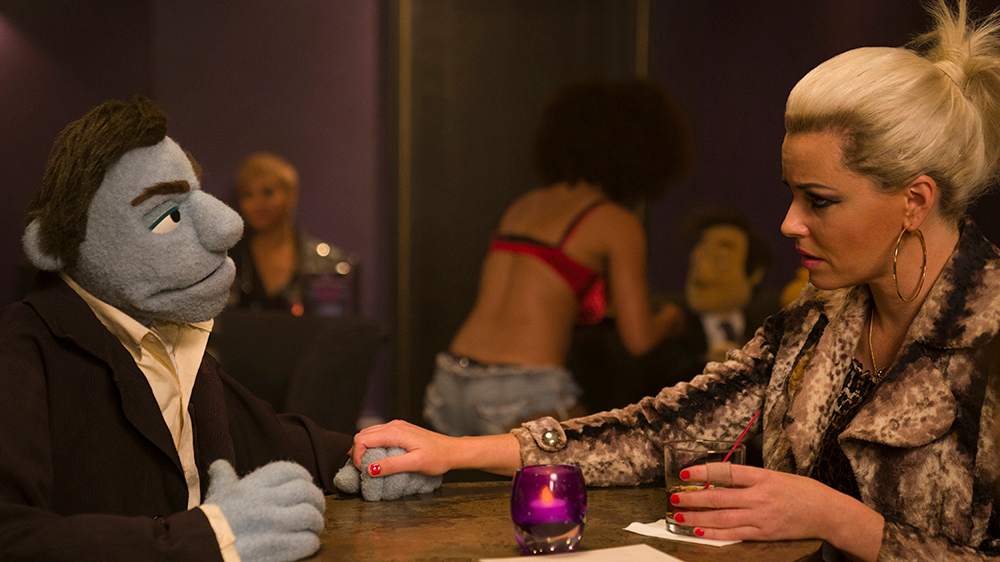Film Review: ‘The Happytime Murders’
By Andrew Barker
LOS ANGELES (Variety.com) – “Avenue Q.” “Meet the Feebles.” “Ted.” “Ted 2.” “Greg the Bunny.” “Wonder Showzen.” Hell, “Who Framed Roger Rabbit.” If each and every one of these titles is completely unfamiliar to you, and you are eager to start studying for your driver’s test, you may well go googly-eyed at “The Happytime Murders,” with its nonstop depictions of innocent-looking yet depraved puppets swearing, smoking, screwing, and exploding into geysers of fluff. For the rest of us, this adolescent YouTube sketch laboriously stretched to 90 minutes is notable only for its provenance – directed by longtime puppetmaster and Jim Henson scion Brian Henson – and its litany of missed opportunities, and it should soon be movin’ right along out of multiplexes.
Much like last year’s similarly misguided “Bright,” “” takes place in a Los Angeles where humans coexist uneasily with an oppressed and despised fictional minority group; in this case, Muppet-like puppets. Beset by sugar addictions and pervasive prejudice, the puppet community’s only successful incursions into the flesh-and-blood mainstream have come via 1980s children’s show “The Happytime Gang” and a groundbreaking puppet LAPD detective named Phil Philips (Bill Barretta). Yet when the film picks up, both have sunken into disrepute: The “Happytime Gang” cast are all eking out marginal existences waiting for syndication royalties to kick in, and Phil is working as a downmarket private detective, having been outcast from the force.
Chain-smoking and cruising around a single stretch of Downtown LA in his ‘70s ride, Phil gets a job from a felt femme fatale (Dorien Davies) dealing with blackmailers, which leads him to a back alley puppet porn shop, where a former “Happytime” star is soon gunned down by a masked assailant. Though the shooting is initially written off as a robbery, Phil starts to suspect a deeper conspiracy when his own brother, also a former Happytimer, quickly winds up dead too.
By this point, Phil has gotten himself in deep enough to rejoin the LAPD as a consultant on the case, yet he’s paired with his former partner on the force, Connie (), who has since developed a set of anti-puppet prejudices (“puppets won’t shoot other puppets”). The two bicker and run through buddy cop clichés as they race to protect the rest of the show’s cast, including its token human, Jenny (Elizabeth Banks), who is also Phil’s former flame.
It should come as no surprise that “Happytime” comes up farcically short as a metaphor for racism. But its most fatal miscalculation is the decision to frontload so many of its crassest setpieces into the first 15 or 20 minutes, depriving the rest of the film of the shock value that is its entire raison d’etre. By the midway point, the movie is so strapped for ideas that it resorts to turning dud one-off jokes (characters mistaking McCarthy for a man, “an asshole says what?”) into painfully extended running gags.
The first project from the Jim Henson Company’s newly launched Henson Alternative shingle, aimed at producing adult-themed content, “Happytime” certainly benefits from a number of veteran puppeteers taking a trip to the dark side: Barretta, Julianne Buescher, and ex-Elmo Kevin Clash among them. (The human cast is less impressive: McCarthy mostly functions as a stone-faced straight-woman, and only Maya Rudolph, as Phil’s secretary Bubbles, manages to steal any thunder.) What’s disappointing, however, is that the film never quite dares to tweak any of the conventions of the Henson legacy itself; frankly, the original “Muppet Show” was infinitely more self-referential. No, this film appears to have one goal and one goal only: to stage a scene where a puppet projectile-ejaculates Silly String. It’s just about the only thing in “The Happytime Murders” that sticks.

